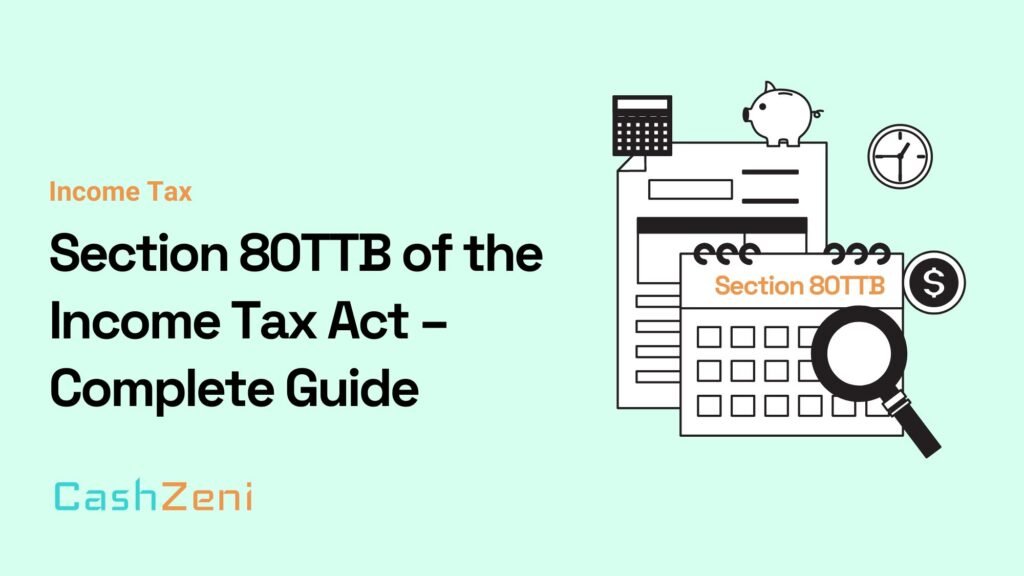In the ever-evolving labyrinth of the Indian Taxation System, knowledge is your greatest ally. Today, let’s uncover one such gem from this complex maze, the Section 80TTB, often overlooked but could be a game-changer for your tax planning strategy. But wait! Before we dive into the depths of this section, let’s shed some light on the larger picture.
Table of Contents
Tax laws, the ground rules of the financial landscape, are notorious for their complexity. Like a beautifully crafted game of chess, each piece (or in our case, section) holds a strategic significance. However, understanding these laws, or at least the ones that are relevant to you, could potentially save you a significant amount of money.
Now, let’s turn our attention to Section 80TTB, a boon to the elderly, a testament to the phrase ‘age is just a number’ in the world of taxes. Curious? Let’s get cracking!
Understanding Section 80TTB
Introduced by the Finance Act, 2018, Section 80TTB is a relatively new addition to the Income Tax Act, 1961 1. Its aim? To alleviate the tax burden on our silver-haired populace – senior citizens. To put it simply, Section 80TTB allows senior citizens (aged 60 and above) to enjoy a higher threshold of tax exemption on their interest income earned from deposits held in banks, co-operative societies engaged in banking, and post offices 2.
But remember, the taxman giveth and the taxman taketh away. If you fall under this category, then you, unfortunately, cannot claim deductions under Section 80TTA, which allows deductions on savings account interest for taxpayers less than 60 years old. A bittersweet reality, perhaps, but beneficial for the seniors, as the deduction limit for Section 80TTB (up to ₹50,000) is higher than that of Section 80TTA (up to ₹10,000) 3.
Benefits of Section 80TTB
Tax laws, albeit confounding, are like the proverbial goose laying golden eggs, and Section 80TTB is no exception. It offers a higher tax exemption limit of ₹50,000 on interest income to senior citizens. This applies to interest from deposits with banks, post offices, and co-operative societies engaged in banking 1.
To paint a clearer picture, let’s dive into a hypothetical scenario. Suppose Mr. Sharma, a 65-year-old retired individual, earns ₹40,000 interest from his fixed deposit and ₹15,000 interest from his savings account in a financial year. Under Section 80TTB, he can claim a deduction for the entire ₹55,000, thereby paying tax on a lower total income. Impressive, isn’t it? 3.
Amount of deductions available under 80TTB
A deduction of Rs 50,000 or the income amount, whichever is lower, is allowed as deduction from the gross total income. Income here means any of the following income in aggregate:
- Interest on bank deposits (savings or fixed)
- Interest on deposits held in a co-operative society engaged in the business of banking, including a co-operative land mortgage bank or a co-operative land development bank
- Interest on post office deposits
Exceptions to Section 80TTB
Suppose the specified deposits are held by or on behalf of a partnership firm. In that case, an Association of Persons (AOP), or a Body of Individuals (BOI), Section 80TTB deduction is not available for the partner of such a firm or any member of such an AOP or BOI while computing their total income.
Section 80TTA vs 80TTB
Section 80TTA provides deductions similar to Section 80TTB. However, it offers interest deductions up to Rs 10,000 only on a savings account (held in a bank, co-operative bank, or a post office) and only for taxpayers below the age of 60 years or to a Hindu Undivided Family (HUF).
With the introduction of Section 80TTB exclusively for senior citizens, deduction under Section 80TTA is not available to senior citizens.
Difference between Section 80TTA and Section 80TTB
| Particulars | Section 80TTA | Section 80TTB |
| Applicability | Applicable to individuals and HUF except for senior citizens | Applicable to senior citizens |
| Specified income | Interest on savings account only | Interest on all kinds of deposits |
| Quantum of deduction | Up to Rs 10,000 | Up to Rs 50,000 |
How to Claim Deductions Under Section 80TTB
So, you’re eager to seize the benefits of Section 80TTB? A wise decision indeed! Here’s how you can go about it:
- Essential documents: Gather the necessary documents showing proof of your interest income, like bank statements or interest certificates from banks and post offices. It’s wise to keep these documents handy for any future scrutiny by the income tax department.
- Filing Income Tax Return: While filing your Income Tax Return (ITR), report the interest income under the head ‘Income from Other Sources’ 4.
- Claim the Deduction: Claim your deduction under Section 80TTB in the deductions section. Remember, the maximum deduction is capped at ₹50,000. Any interest income beyond this limit will be taxable.
Remember, ‘to err is human,’ but when it comes to taxes, mistakes can be costly. So, ensure you don’t mix up Section 80TTB with Section 80TTA. The latter applies to taxpayers below 60, and the two cannot be claimed simultaneously. 3.
Impact of Section 80TTB on Tax Planning
Let’s face it, no one fancies parting with their hard-earned money. But alas, taxes are an undeniable reality. However, with effective tax planning, you can ensure your tax liability doesn’t burn a hole in your pocket.
- For Senior Citizens: With a higher exemption limit under Section 80TTB, senior citizens can enjoy better post-tax returns from their deposits, thus augmenting their retirement corpus. Now, that’s what we call ‘aging gracefully’!
- For Non-Senior Citizens: While non-senior citizens cannot directly benefit from Section 80TTB, awareness about it prepares them for future financial planning. It helps to know what the tax landscape will look like when you hit the golden 60.
- Effective Tax Planning: With Section 80TTB in your arsenal, you can make informed decisions to optimally structure your investments and minimize your tax liability. After all, in the chessboard of finance, every move counts! 5.
Illustration on tax savings by senior citizens
Senior citizens already enjoy a higher basic exemption limit compared to normal taxpayers. The introduction of Section 80TTB further aids tax savings for senior citizens. Let us see how with the following example. Let us consider the following incomes for a taxpayer:
- Savings interest of Rs 5,000
- Interest on fixed deposits of Rs 2,00,000
- Other income of Rs 1,50,000
Now, the following table will help you understand how a senior citizen stands to benefit (as against a normal taxpayer) with the provisions of Section 80TTB
Computation of Taxable Income
| Particulars | Non-Senior Citizen (Rs) | Senior Citizen (Rs) |
| Savings interest | 5,000 | 5,000 |
| FD interest | 2,00,000 | 2,00,000 |
| Other income | 1,50,000 | 1,50,000 |
| Gross total income | 3,55,000 | 3,55,000 |
| Less: Deduction under Section 80TTA | 5,000 | Not Applicable |
| Less: Deduction under Section 80TTB | Not Applicable | 50,000 |
| Taxable income | 3,50,000 | 3,05,000 |
In the above example, a non-senior citizen can claim only a savings interest deduction of Rs 5,000 under Section 80TTA. Whereas a senior citizen can claim savings interest and fixed deposits interest deduction restricted up to Rs 50,000.
Conclusion
As we navigate through the complex corridors of the Indian Taxation System, it becomes clear that knowledge is indeed power. The more aware we are about sections like 80TTB, the better equipped we are to make prudent financial decisions. For senior citizens, it’s a great tool that can significantly augment their post-retirement finances, and for the rest, it’s a peek into the future of tax planning.
Remember, the chess game of finance is not always about making more money, but also about keeping more of what you have. And in this game, tax laws like Section 80TTB are not just pawns but powerful knights in your financial arsenal. As the famous saying goes, “In this world, nothing can be said to be certain, except death and taxes.” We might as well be prepared!
References:
- Income Tax Act, 1961. Available at https://www.incometaxindia.gov.in/Pages/acts/income-tax-act.aspx
- Finance Act, 2018. Available at https://www.incometaxindia.gov.in/pages/acts/finance-acts.aspx
- CashZeni – Section 80TTB. Available at https://CashZeni.in/s/80TTB
- Income Tax Services – Filing Income Tax Return. Available at https://www.incometaxindia.gov.in/Pages/tax-services/filing-income-tax-return.aspx
- Investopedia – Tax Planning. Available at https://www.investopedia.com/terms/t/tax-planning.asp
FAQs about Section 80TTB
What is the maximum limit for deduction under Section 80TTB?
The maximum deduction that can be claimed under Section 80TTB is ₹50,000. This limit applies to the total interest income from all eligible sources.
Can I claim deduction under both 80TTA and 80TTB?
No, deductions cannot be claimed under both sections simultaneously. If you are eligible for Section 80TTB (i.e., you’re a senior citizen), you cannot claim deductions under Section 80TTA
Are non-resident senior citizens eligible for Section 80TTB benefits?
Yes, non-resident senior citizens can also claim deductions under Section 80TTB, as long as they meet the age criteria



